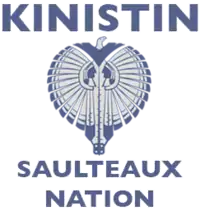Kinistin Saulteaux Nation
The Kinistin Saulteaux Nation is a Saulteaux band government in Saskatchewan. Their reserve is 39 kilometres (24 mi) southeast of Melfort. The Kinistin Saulteaux Nation is a signatory of Treaty No. 4, which was signed by Chief Yellow-quill on August 24, 1876.
 | |
| People | Saulteaux |
|---|---|
| Treaty | Treaty 4 |
| Headquarters | Tisdale |
| Province | Saskatchewan |
| Land[1] | |
| Main reserve | Kinistin 91 |
| Other reserve(s) | |
| Land area | 41.48 km2 |
| Population (2019)[2] | |
| On reserve | 339 |
| Off reserve | 750 |
| Total population | 1089 |
| Government[3] | |
| Chief | Gregory Scott |
| Tribal Council[4] | |
| Saskatoon Tribal Council | |
| Website | |
| kinistin.sk.ca | |
Total registered population in February, 2009, was 913, of which the on-reserve population was 328 members. The First Nation is a member of the Saskatoon Tribal Council and have their urban offices in Saskatoon as well as their Tribal Council offices.
History
The First Nation was originally part of the Yellow-quill Saulteaux Band, a Treaty Band named after a Treaty 4 signatory Chief Ošāwaškokwanēpi, whose name means "Green/Blue-quill." However, due to "š" merging with "s" in Nakawēmowin (Saulteaux language), this led to a mistranslation of his name as "Yellow-quill"—"yellow" being osāw-, while "green/blue" being ošāwaško- (or osāwasko- in Saulteaux). Kinistin is named after Chief Kiništin ("Cree"), one of the headmen for Chief Ošāwaškokwanēpi. Chief Kiništin came to Saskatchewan from Western Ontario along with his two brothers, Miskokwanep ("Red [Crow-]Feather") and Mehcihcākanihs ("Coyote"). In 1901, lands were set aside for the Kinistin Band. Soon after the death of Chief Ošāwaškokwanēpi, the Yellow-quill Saulteaux Band divided into three groups, with the group originally headed by Chief Kiništin becoming the Kinistin Saulteaux Nation.
Reserves
The First Nation have reserved for themselves three reserves:
- 3,562.90 hectares (8,804.1 acres) Kinistin Reserve 91, which serves as their main Reserve.
- 457.30 hectares (1,130.0 acres) Kinistin Reserve 91A
- 37.1 hectares (92 acres) Treaty Four Reserve Grounds (Indian Reserve 77), which is shared with 32 other First Nations.
Governance
Kinistin have an elected tribal council consisting of a chief and five councillors. The current council for the two-year-long electoral term ending in April 2019, consists of Chief Greg Scott and Councillors Felix Thomas, Wayne J. Thomas, Joseph Smokeyday, Cecil McNab and Craig Thomas.
References
- "First Nation Detail". Indigenous and Northern Affairs Canada. Government of Canada. Retrieved September 10, 2019.
- "First Nation Detail". Indigenous and Northern Affairs Canada. Government of Canada. Retrieved September 10, 2019.
- "First Nation Detail". Indigenous and Northern Affairs Canada. Government of Canada. Retrieved September 10, 2019.
- "First Nation Detail". Indigenous and Northern Affairs Canada. Government of Canada. Retrieved September 10, 2019.